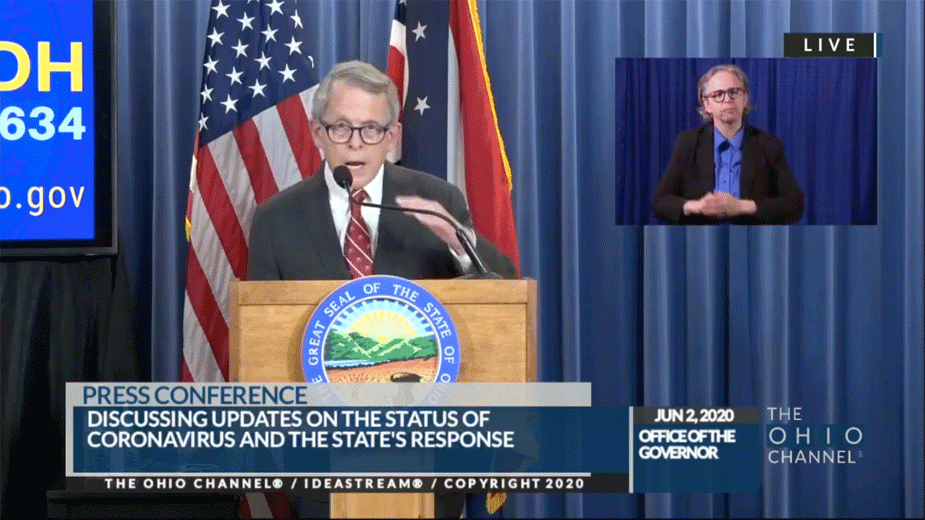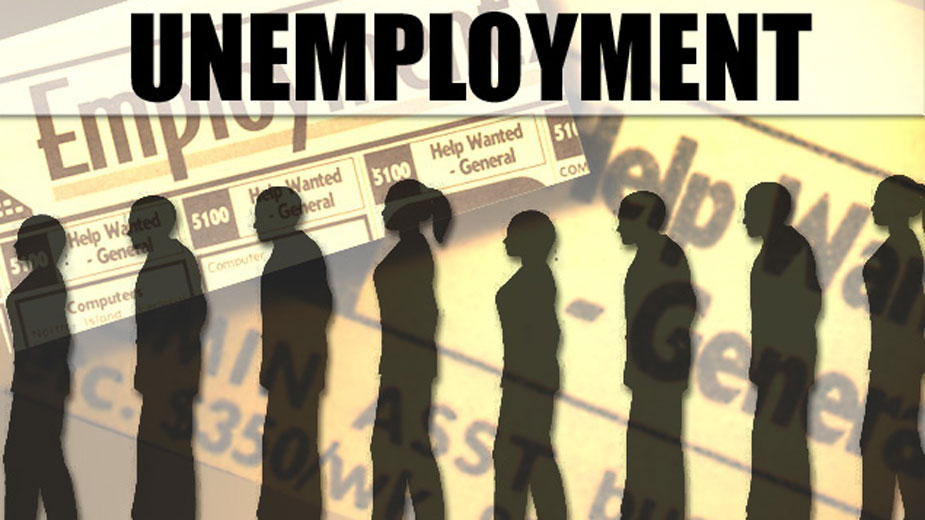DeWine Pledges Work on Racial Inequity, Police Reform
YOUNGSTOWN, Ohio – Gov. Mike DeWine pledged Tuesday to work with state leaders to address racial inequities and police reform.
“Race is certainly a factor in all kinds of health, education and economic disparities. The issue of race has plagued this country since its inception,” DeWine said. “While there’s no simple solutions, all of us have an obligation to be a positive voice and advance change for all those who are marginalized. We have an obligation to create equality in health, education and economic opportunities for all citizens.”
The governor said that he will be meeting with the General Assembly and will return to the podium Thursday with more specifics on proposals. Among the issues DeWine specifically called out are lead poisoning, infant and maternal mortality rates for black people, the drug epidemic and mental health care.
“The General Assembly and I have made a start. Is it enough? Certainly not. We must go further,” he said. “Despite the great efforts by many people, we still have too many Ohioans living in the shadow of opportunity. Too many live in the margins. Still, there is racism in Ohio and across the country. Still, there is inequity.”
He added that the minority health task force will be issuing long-term plans to address racial disparities in health care later this month.
Also on the table with the Statehouse are police reforms, such as required training on implicit bias, de-escalation and recognizing those with mental health challenges. Best practices, DeWine said, should be adopted by all law enforcement agencies in the state.
“We must improve law enforcement’s access to quality training. It’s an ongoing process. We made progress in the eight years I was attorney general. With Gov. Kasich and the state legislature, we worked together to improve those things and we must continue that,” he said. “We must improve transparency between the public and police departments. We must work to recruit more minorities, more people of color to serve as officers. We must have more oversight and accountability in regard to our police departments.”
The governor also suggested more uniformity in how police shootings are investigated and the creation of a licensure for officers.
“If you’re a nurse or teacher, you get a license. You can lose a license. There’s a central board with that authority,” DeWine said. “This is a profession, a noble profession. It should be treated as a profession, which means the ability to see someone, if they do something, lose that license. I’ll have a recommendation by Thursday. We’ll work with the General Assembly and chiefs of police. There need to be changes.”
DeWine’s press conference came after an intense week of nationwide protests stemming from the death of George Floyd in Minneapolis, when officer Derek Chauvin kept his knee pressed firmly into Floyd’s back for nearly nine minutes as he repeatedly said, “I can’t breathe.” Protests have sprung up across the state, including Youngstown and Warren.
On a phone call with governors including DeWine Monday, President Donald Trump urged the state leaders to “dominate” protestors.
“If you don’t dominate, you’re wasting your time,” the president said. “They’re going to run all over you, you’ll look like a bunch of jerks. You have to dominate, and you have to arrest people, and you have to try people and they have to go to jail for long periods of time.”
DeWine said Ohio was not specifically mentioned during the call, but said he felt the state has responded well to the protests.
“I think the [police] departments have done a good job. The mayors have done a good job. I’ve made clear as the governor of Ohio that we’re ready to send in the National Guard and make the Ohio State Highway Patrol available. All of that is in support of local government. We’re a local government state and we like it that way,” he said. “I believe cities are in a good position at this point, but we’re monitoring it every single hour. I think this is how Ohioans want this handled.”
Joining DeWine for the press conference were Col. Rick Fambro, superintendent of the Highway Patrol and Maj. Gen. John Harris, commander of the Ohio National Guard.
The cities where the Highway Patrol has aided local departments during protests are those that have worked with the agency in the past, Fambro said. In cities like Cincinnati, Cleveland and Dayton, he added, troopers have aided in directing traffic “so local law enforcement can have that safe environment for people to express their first amendment right.
“These protests are different, but we pride ourselves on the motto of, ‘Service with Respect,’ ” Fambro said. “That’s exactly what we expected from our people as they interact with these communities.”
The Ohio National Guard has sent contingents to Cleveland and Columbus to add local law enforcement during protests. Those deployments came at the request of the mayors, Harris said.
“Those forces are specially trained for that mission. It’s comprised of military police units, some of them serving as law enforcement in their day-to-day capacity,” he said. “A key principal is graduated response. We do nothing except use the minimal force necessary to complete the mission. … If we have to protect a protestor or we have to protect a rioter, we will that every single person with dignity and respect.”
After giving an update on the state of coronavirus in Ohio, Department of Health director Dr. Amy Acton spoke on the impact structural racism has on public health. She noted that in the state’s health plan, addressing health equity among all Ohioans is the underlying premise throughout.
“It is unacceptable that your ZIP code, on average, can predict how long you will live. There are things we can’t control, but there are things you can control. Even in the times we’re on our knees and reeling, there’s a pearl of hope that we can do more. It’s going to take every ounce of our courage in the times to come to do more,” she sad. “When we don’t realize our full potential, all of us suffer. It isn’t a zero sum game. We have got to do better.”
With a shake in her voice and on the verge of tears, Acton also encouraged Ohioans to be exercise their first amendment right to protest in a safe way.
“Please, use your voice. Speak, but more importantly listen. I beg of you not to hurt one another. We cannot let ourselves see the other person as the ‘other,’ ” she said. “We ask that everyone [protest] as safely as we can. I’ve seen pictures of people trying to. … It’ll be weeks before we know what impact this might be having. Speak and do so safely. Do it with safety and thoughtfulness for each other.”
The press conference also touched on business relief for those affected by the coronavirus pandemic. Lt. Gov. Jon Husted announced three new programs approved the State Controlling Board Monday: grants of up to $10,000 for minority- and women-owned businesses, a $10 million loan fund with interest rates under 2% for businesses in the state’s Appalachian region – including Mahoning, Trumbull and Columbiana counties – and grants of up to $500,000 to help manufacturers retool to produce personal protective equipment.
“We were caught flat-footed as a nation because we didn’t have PPE and in many cases it was not made in the country or the state. We had many businesses step up to help during this crisis, so one thing we do to reshore some of that production is the Ohio Retooling Grant to help manufacturers,” Husted said, noting that 20% of the $20 million fund is being set aside for manufacturers with fewer than 25 employees.
“We want to prepare for future challenges. We want to help our small businesses be part of that solution,” he said.
DeWine also announced that all surgeries and medical procedures can resume and that the state is working to develop “a broad outline” for school districts to reopen for classes in the fall. Though the state “fully intends” to have schools reopen, he said the decision ultimately falls with to the school district.
Copyright 2024 The Business Journal, Youngstown, Ohio.



